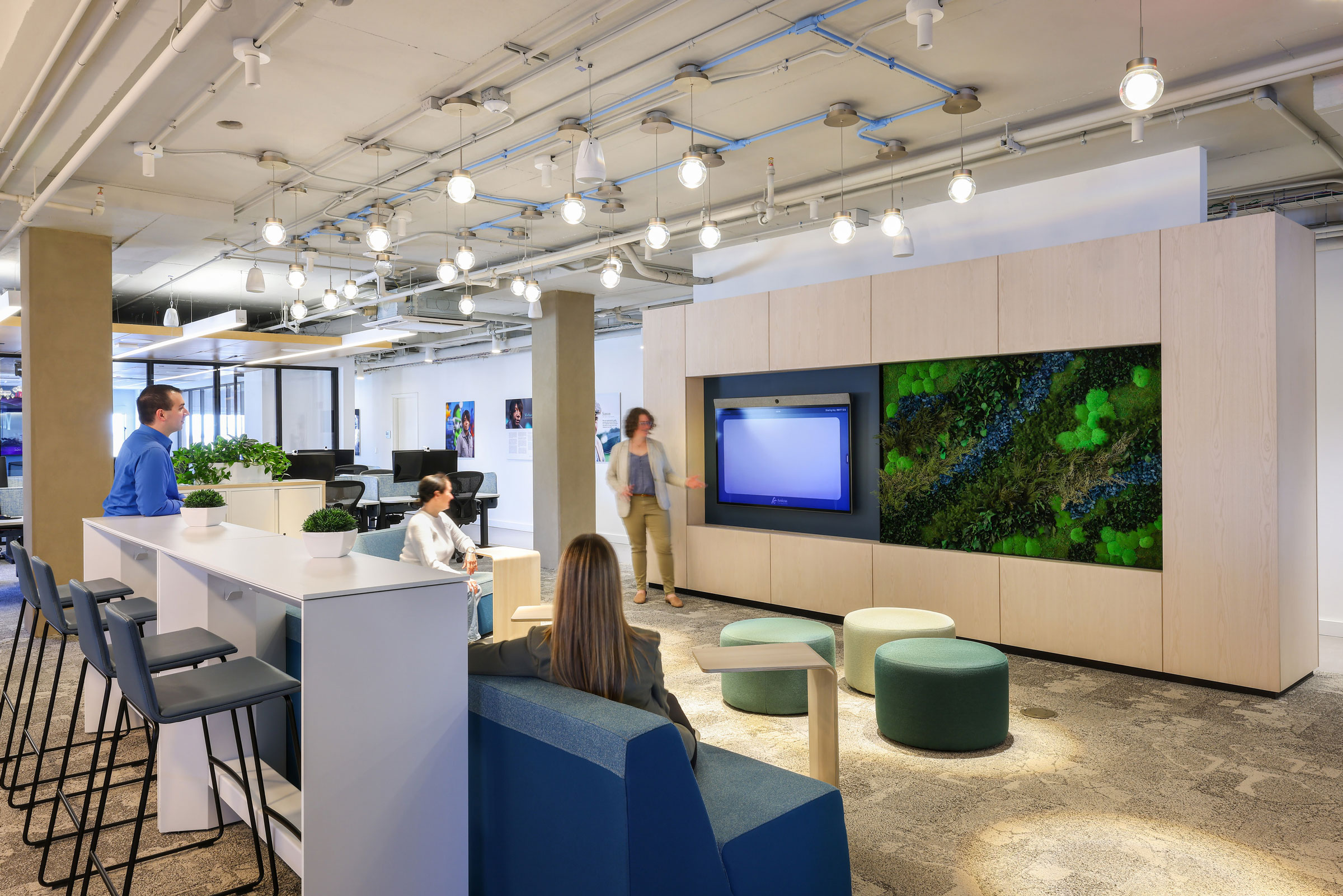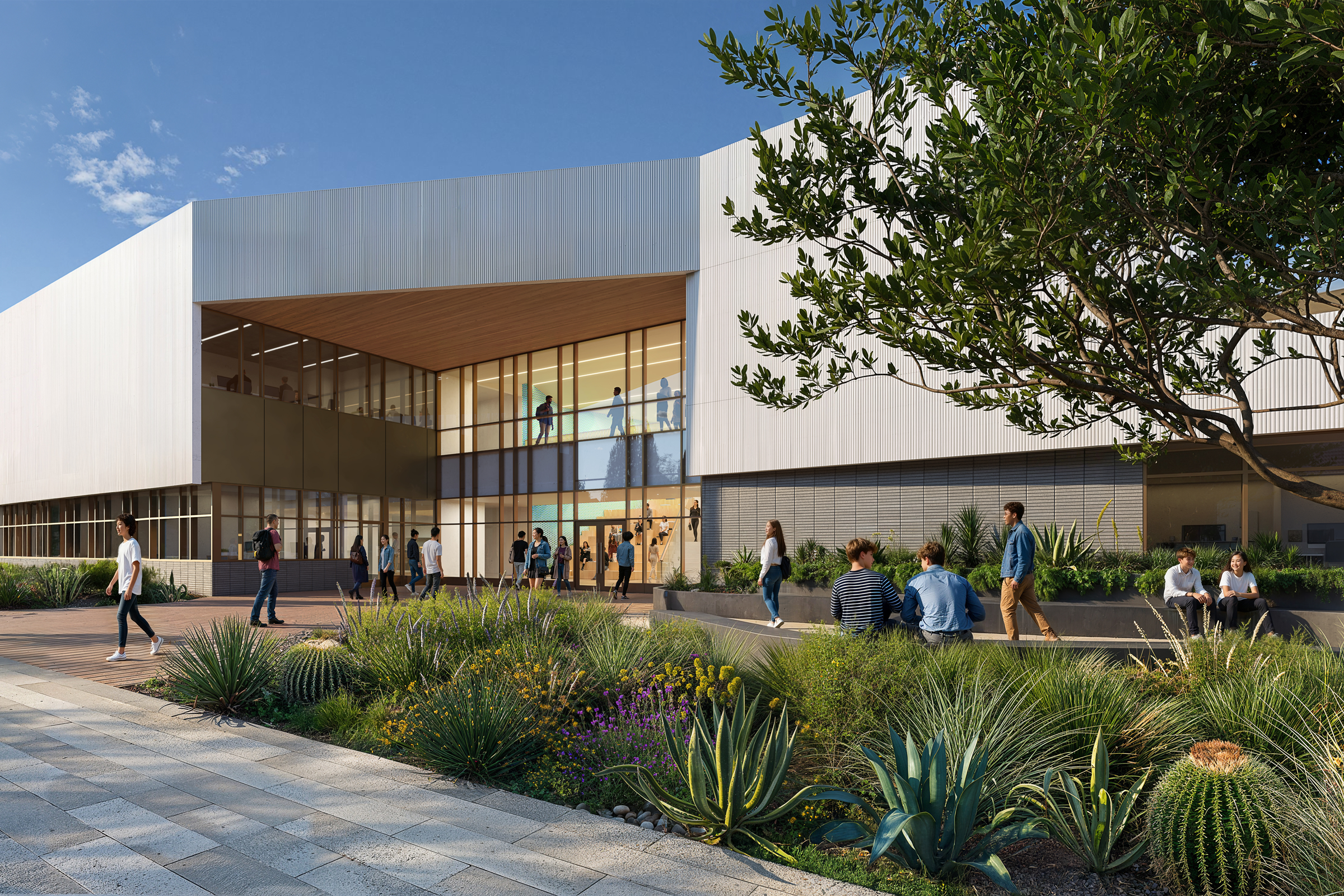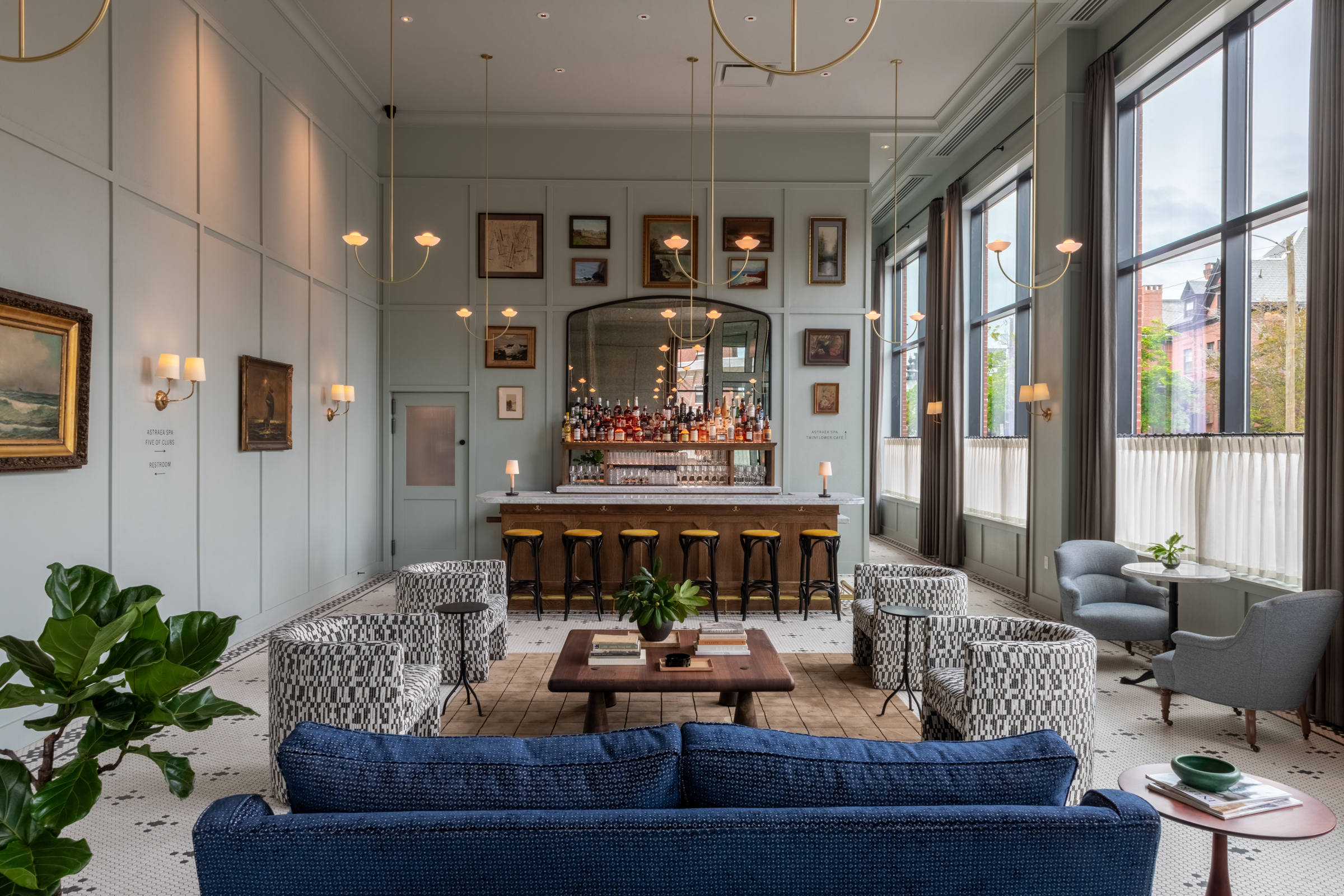Story at a glance:
- Ware Malcomb designed a new headquarters for Amicus Therapeutics focusing on well-being and community.
- The project emphasizes flexible work environments promoting collaboration and employee wellness.
- The new office incorporates energy-efficient systems and sustainable features.
Amicus Therapeutics, a biopharmaceutical company founded in Philadelphia to find solutions for a rare muscle disorder called Pompe disease, has moved into its new global headquarters in Princeton, New Jersey.
Designed by Ware Malcomb, the 27,240-square-foot office is situated on the fourth and fifth floors of 47 Hulfish Street in Princeton’s bustling Palmer Square district and emphasizes connectivity, well-being, and sustainability.
“We worked with Amicus from the beginning, starting with site selection, which was an important component of the project,” says Marlyn Zucosky, Ware Malcomb’s regional director for Princeton and Newark. “They made a decision from a sustainability standpoint that they wanted to be downtown so that when their employees drove to the office, they could park their cars and not have to drive again for the rest of the day.”
Needing a large footprint, there were limited options, and when they stumbled on the Hulfish building, it was a perfect fit except for one minor problem—there were already tenants occupying some of the spaces. Thankfully the broker was able to work out relocation plans for everyone, allowing Amicus to have the two full floors it needed. “That caused the project to be done in phases, as not everyone moved out at the same time, so we started working on the fifth floor first, followed by the fourth floor,” Zucosky says.
Design for Flexibility
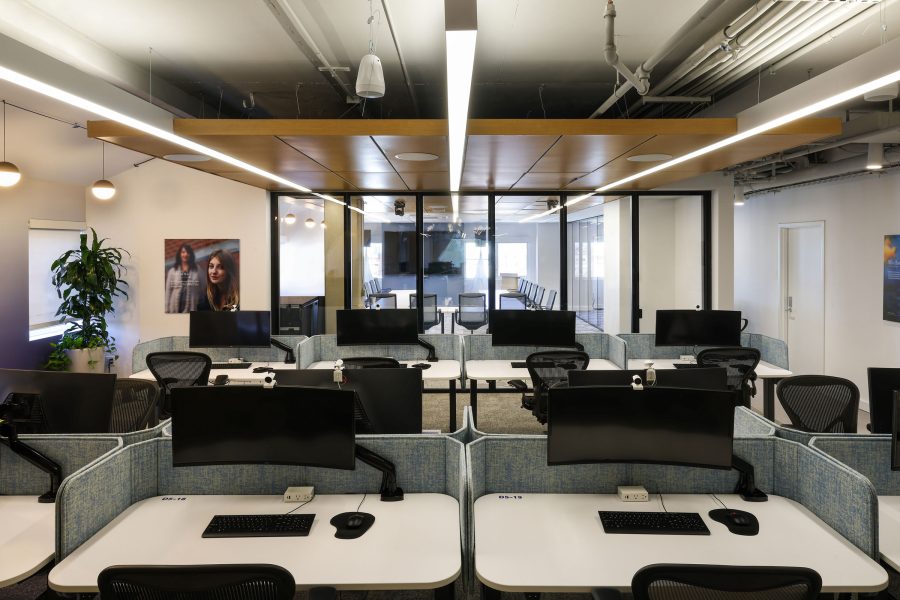
Movable workstations and the MetroWall Extend Series movable glass walls are seen here inside the new Amicus Therapeutics headquarters. Photo by Chris Lo Bue Photography
The goal from the get-go was for Amicus to transition into a new workplace strategy, which included unassigned seating as well as untethered seating. “This was a new concept for us,” Zucosky says. “Employees have the flexibility to move their desks, so we designed the workstations as individual units that can be easily relocated. This approach fosters an open and sophisticated neighborhood atmosphere.”
As a post-Covid buildout, the Ware Malcomb team took the lessons it learned about community during that time, creating an interior that focuses on a common core with cohesive elements that enhance connectivity among the surrounding flexible office spaces.
“One of the interesting features is that we have a lot of convertible spaces, which are multi-use areas. We had the idea for glass walls for transparency, but we also needed to have them be closed rooms for sound attenuation and privacy purposes,” Zucosky says. “We worked very closely with MetroWall, a glass/wall manufacturer, and they engineered pivoting walls for us, so you can open them, and that’s a unique feature of this project.”
Design for Biophilia
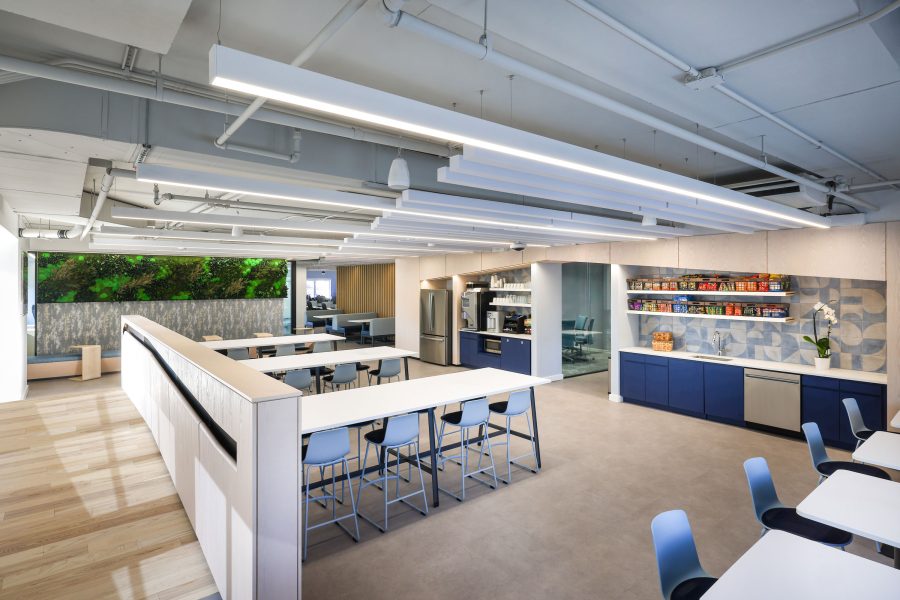
This gathering space inside Amicus Therapeutics headquarters includes a preserved plant wall, LED lighting, acoustical baffles, and natural wood flooring throughout space. Photo by Chris Lo Bue Photography
Chelsea Chamra, senior interior designer of Ware Malcomb, says biophilic design was achieved by strategically placing preserved greenery in areas where employees socialize. This included the main lounges and café space, where preserved moss was placed on the wall, and blue greenery was added to enhance the Amicus logo. “There are also many real plants throughout the space that enhance the greenery,” she says.
Two outdoor components are also part of the project design, and the private outdoor patio space was a deciding factor in the building selection. “There was an existing roof terrace, and we built out a second roof terrace, so you can go out and see real trees,” Zucosky says. “Every time I have visited the building post-occupancy, the terraces are very active.”
More Sustainable Details
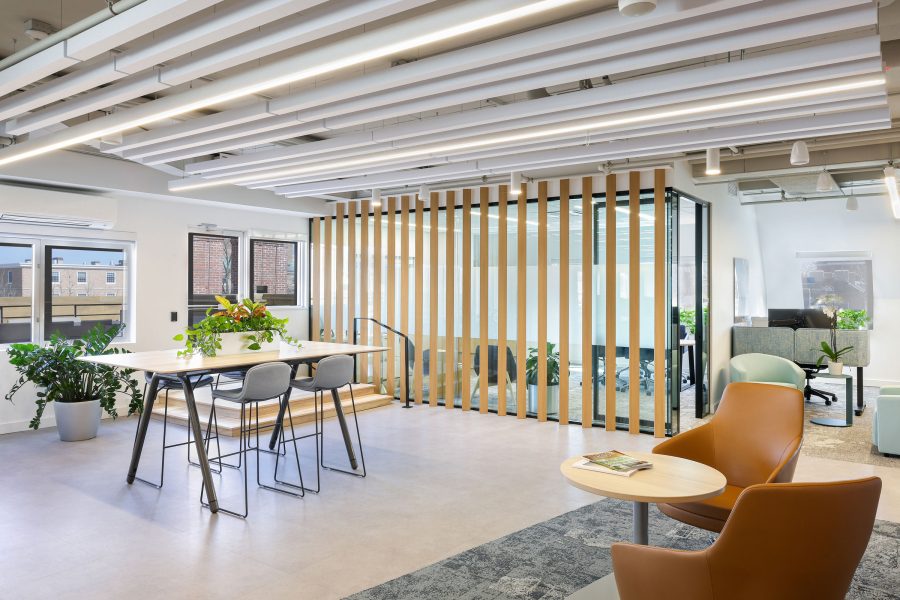
The Amicus Therapeutics headquarters design by Ware Malcomb emphasizes visibility to outdoor patio space, with lots of plants throughout, natural lighting, and natural wood materials for slats and steps. Photo by Chris Lo Bue Photography
Ware Malcomb utilized a number of energy-efficient systems in its design, including LED lighting with dimming capabilities throughout the space.
“For a lot of the material selection we really considered our carbon footprint, so many materials have embodied carbon or are PVC-free and recyclable,” Chamra says. “In designing the space we aimed to allow as much natural light in as possible. For instance, regarding the workstations, we wanted to ensure all employees had access to natural daylight.”
In the café areas employees have access to healthy snacks and food options, the bathrooms all feature low-flow plumbing, and there’s trash and recycling usability integrated throughout the space, maintaining a sustainable and wellness-oriented mindset.
“Since they are a biopharma company, Amicus wanted health and wellness to be promoted in every possible opportunity,” Chamra says. “This is a very mission-driven health care company, and they are looking to improve the lives of those suffering from this terrible disease, and that was a frequent topic during our conversations.”
There’s even a small area dedicated to a patient, and large photographs of patient testimonials are displayed throughout the space. “From a graphics perspective we used some of their research slides by magnifying certain cells approximately 10,000 times, and we used them as wall graphics, making it look like abstract art,” Zucosky says. “There are so many gentle, subtle reminders throughout the space of what the company’s mission is.”
Problem-Solving
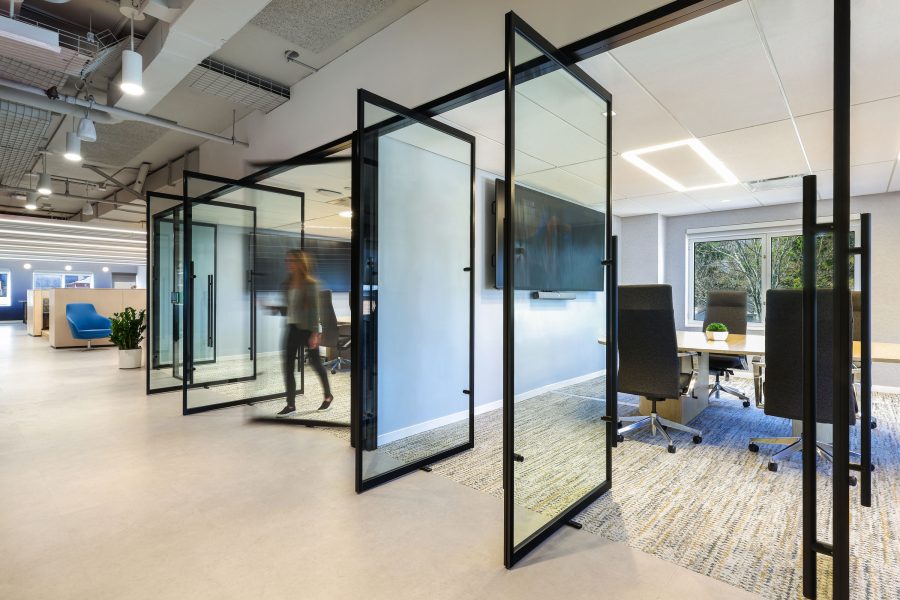
The MetroWall Extend Series movable glass walls open to the Amicus Therapeutics office. Photo by Chris Lo Bue Photography
Being on the top floor of the building, the roof sloped slightly, so there wasn’t full head clearance everywhere, and Ware Malcomb needed to be mindful of where it placed things, adding some complexity to the design. But that was one of the few challenges of the project, and it didn’t cause any significant problems.
Although it always designs projects with an ADA-accessible mindset, Ware Malcomb thought creatively about the needs of those in wheelchairs, as people with Pompe disease can’t walk, and they wanted to ensure it was an ideal space for everyone. Having agile and flexible work environments helped in this regard.
“Post-occupancy we received a lot of feedback from Amicus that our mobile and untethered approach is being utilized as intended,” Chamra says. “With these mobile workstations, the space can really evolve over time, making it future-proof, as Amicus can revise the layout or propose new purposes within these areas.”
Project Details
Project: Amicus Therapeutics HQ
Location: Princeton, NJ
Completion: March 2024
Size: 27,240 square feet
Architect & Interior Design: Ware Malcomb
Engineer: Engineering Driven Design PC
Contractor: Sweetwater Construction Corp
Structural Engineer: Venezia Engineering

